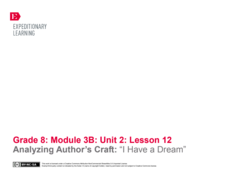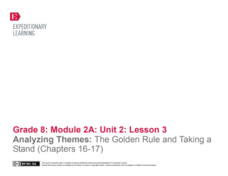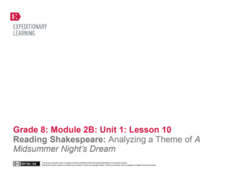EngageNY
Analyzing Author’s Craft: “I Have a Dream”
It's time to make some connections! Scholars complete a close reading of the speech I Have a Dream by Martin Luther King, Jr. They use an I Have a Dream Speech Gist Note-catcher, and I Have a Dream text-dependent questions to guide their...
EngageNY
Analyzing Theme: The Invisibility of Captives during WWII
Can you see me now? Scholars discuss two definitions of invisibility and then connect the definitions to text evidence related to Louie's invisibility in Unbroken. Readers turn their attention to The Life of Miné Okubo and record text...
EngageNY
Introducing a Thematic Concept: Becoming Visible Again after Captivity
Share your thoughts. Scholars use Think-Pair-Share to answer questions related to Louie in Unbroken. The class completes the Becoming Visible Again anchor chart to understand the text's theme better. They write an example of Louie...
EngageNY
Gathering Textual Evidence: “Invisibility” of Those Interned
Add another layer to the class's understanding. Scholars deepen their knowledge of the primary sources in their Japanese-American Internment during World War II packet and determine how the sources relate to the theme of invisibility....
EngageNY
Understanding Perspective: Japanese Society’s Impact on Japanese Guards (Pages 189-197)
The focus is on written communication as class members respond to questions about the text Unbroken in their Written Conversation note catchers. They trade note catchers with a partner every two minutes and then share ideas from their...
EngageNY
Introducing a Thematic Concept in This Unit: The “Invisibility” of Captives during WWII (pages 170-181)
Scholars discuss the phrase identity is erased and how it relates to the theme of invisibility. They use their Understanding Invisibility note catcher to identify how invisibility may occur within a person. They then work on a Gathering...
Teachers Network
Witness for the Prosecution: Online Newspaper
Agatha Christie's Witness for the Prosecution becomes the text for an online newspaper activity. Young journalists craft news, features, obituary, and opinion articles based on the characters and events in the play.
EngageNY
Analyzing a Thematic Concept: The Invisibility of Captives during WWII (Pages 182-188)
Readers complete a word web-based on the word dignity. They use their Understanding Invisibility note catcher to discuss how dignity relates to the theme of invisibility. After group discussion comparing invisibility and loss of dignity,...
EngageNY
Mid-Unit Assessment: Justification for Character and Scene Selection
When it comes to love and midsummer nights, confessions are tricky. Learners place themselves in the shoes of a character from William Shakespeare's A Midsummer Night's Dream and explain how a character manipulated another character in...
EngageNY
Launching The Performance Task: Building Background Knowledge: “War in the Pacific,” Part 1
It's all about a bit of give and take. Scholars silently read War in the Pacific and circle any unfamiliar words. Using context clues, they write each word on a strip of paper along with the inferred definition. After looking the word up...
EngageNY
Launching the Performance Task: Thematic Statement and Narrative Prompt
Scholars think about what message Laura Hillenbrand tries to convey to readers in Unbroken. They begin by sharing their thoughts as thematic statements. After sharing, learners work on explaining their ideas in an Unbroken Thematic...
EngageNY
Performance Task: Readers Theater Performance
It's show time! Scholars finalize their learning by performing their Reader's Theater script of To Kill A Mockingbird. As groups of actors perform, the remaining pupils give feedback using a rubric. After all groups finish, each person...
EngageNY
Writing an Argument Essay: Evaluating the Model and Crafting a Claim
Pupils prepare to write argumentative essays based on Shakespeare's A Midsummer Night's Dream. They begin weighing evidence and crafting claims for their writing about control.
EngageNY
Leaving the Play: All’s Well That Ends Well
How does Shakespeare develop the theme of control in A Midsummer Night's Dream? Using the resource, scholars analyze the theme of parental control in the play and the Greek myth "Pyramus and Thisbe." Next, they talk to partners to...
EngageNY
Analyzing How Shakespeare’s Play Draws upon Greek Mythology: Part 3
How do the narrative and play versions of the myth "Pyramus and Thisbe" affect meaning? Scholars reread Act 5, Scene 1 from Shakespeare's A Midsummer Night's Dream and compare its structure to "Pyramus and Thisbe." Next, they use a...
EngageNY
Analyzing Character and Theme: Tracking Control in A Midsummer Night’s Dream
Scholars examine how characters try to control one another in Shakespeare's A Midsummer Night's Dream. They engage in a read-aloud and class discussion to iron out ideas. They also work in small groups to complete a note-catcher...
EngageNY
Characters’ Decisions: The Flow of Consequences in Midsummer
Class members meet in their drama circles and share their thoughts on why it might be necessary for the audience to know something the characters don't. They read Act 3 Scene 2 of A Midsummer Night's Dream and complete consequence flow...
EngageNY
Author’s Craft: Poetry and Prose
During a drama circle, scholars closely examine the play created in the play A Midsummer Night's Dream. The pupils read Act 3 Scene 1 and turn and talk to their partners about the scene. They then complete a handout and discuss the...
EngageNY
Analyzing Language, Character, and Theme: World Café Discussion
As part of their study of A Midsummer Night's Dream, class members meet in a drama circle to discuss and role-play scenes from the play. They then engage in an activity called World Cafe, analyzing the characters' actions from the text....
EngageNY
Four Corners: Taking a Stand in To Kill a Mockingbird (Chapters 24-26 Plus Synthesis of Scenes in Previous Chapters)
Think outside the box! Scholars work on the Frayer Model, completing boxes for the word integrity. They turn and talk with partners to discuss real-life examples and some from To Kill A Mockingbird. Readers then discuss integrity, taking...
EngageNY
Analyzing Themes: The Golden Rule and Taking a Stand (Chapters 16-17)
Positive or negative? Class members take another look at one of the taking-a-stand photographs from lesson plan one. They talk with partners to connect the picture to the text in To Kill A Mockingbird and discuss to determine when taking...
EngageNY
Analyzing Character and Theme: Tracking Control in A Midsummer Night’s Dream
Pupils first participate in a drama circle as they continue reading Shakespeare's A Midsummer Night's Dream aloud with classmates. Next, scholars move around and discuss text-dependent questions about the play with a Three Threes in a...
EngageNY
Author’s Craft: The Poetry of the Play
Feel the rhythm! Pupils begin reading Act 2, Scene 1 of Shakespeare's A Midsummer Night's Dream as they continue participating in a drama circle. With discussion, they examine Shakespeare's use of rhyme, rhythm, and meter, analyzing how...
EngageNY
Reading Shakespeare: Analyzing a Theme of A Midsummer Night’s Dream
After finishing Act I, scene 1 from Shakespeare's A Midsummer Night's Dream, class members study the theme of control as it relates to the play and start an Evidence of Control note-catcher worksheet.

























